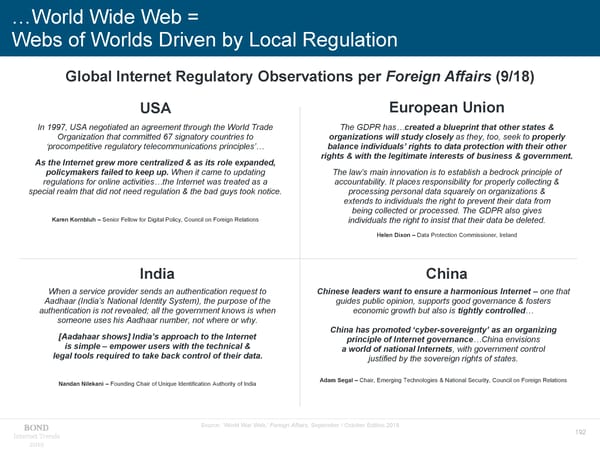…World Wide Web = Webs of Worlds Driven by Local Regulation Global Internet Regulatory Observations per Foreign Affairs (9/18) USA European Union In 1997, USA negotiated an agreement through the World Trade The GDPR has…created a blueprint that other states & Organization that committed 67 signatory countries to organizations will study closely as they, too, seek to properly ‘procompetitive regulatory telecommunications principles’… balance individuals’ rights to data protection with their other As the Internet grew more centralized & as its role expanded, rights & with the legitimate interests of business & government. policymakers failed to keep up. When it came to updating The law’s main innovation is to establish a bedrock principle of regulations for online activities…the Internet was treated as a accountability. It places responsibility for properly collecting & special realm that did not need regulation & the bad guys took notice. processing personal data squarely on organizations & extends to individuals the right to prevent their data from being collected or processed. The GDPR also gives Karen Kornbluh – Senior Fellow for Digital Policy, Council on Foreign Relations individuals the right to insist that their data be deleted. Helen Dixon – Data Protection Commissioner, Ireland India China When a service provider sends an authentication request to Chinese leaders want to ensure a harmonious Internet – one that Aadhaar (India’s National Identity System), the purpose of the guides public opinion, supports good governance & fosters authentication is not revealed; all the government knows is when economic growth but also is tightly controlled… someone uses his Aadhaar number, not where or why. [Aadahaar shows] India’s approach to the Internet China has promoted ‘cyber-sovereignty’ as an organizing is simple – empower users with the technical & principle of Internet governance…China envisions legal tools required to take back control of their data. a world of national Internets, with government control justified by the sovereign rights of states. Nandan Nilekani – Founding Chair of Unique Identification Authority of India Adam Segal – Chair, Emerging Technologies & National Security, Council on Foreign Relations Source: ’World War Web,’ Foreign Affairs, September / October Edition 2018 Internet Trends 192 2019
 Internet Trends 2019 - Mary Meeker Page 38 Page 40
Internet Trends 2019 - Mary Meeker Page 38 Page 40